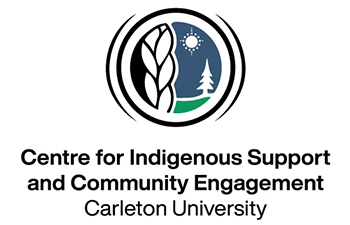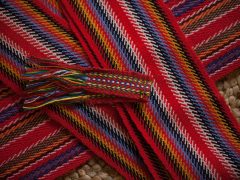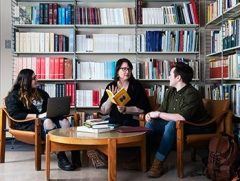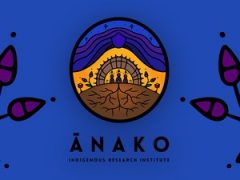We, the people of the Faculty of Science at Carleton University, acknowledge that our campus is located on the traditional, unceded territories of the Algonquin Anishinabeg people. Miigwetch to the Algonquin Anishinabeg people for their stewardship of this territory and the teachings that come from it. We are grateful for this land, the air we breathe, and the water that sustains us all as well as the animals, plants and other living beings: these enable us to research, teach, mentor, support, study, and learn. We recognize our responsibility to our natural environment and to reconciliation with Indigenous peoples.
Overview
We recognize the need to bring reconciliation to all aspects of our scientific activities, from formulating research questions, knowledge sharing and co-production, working with students, teaching, while also focusing on the social contexts and ethics of scientific research.
Guided by Indigenous colleagues and students, the Calls to Action of Kinàmàgawin (2020), and the 10 Calls to Action to natural scientists working in Canada (2020), as well as discussions with members of the Faculty of Science, we are presenting a Faculty of Science Indigenous Initiatives plan.
This page outlines four areas the Faculty of Science will focus on to uphold the calls to action of Kinàmàgawin, as well as ideas for carrying out this plan and effecting change.
Build Connections Between Carleton Science and Indigenous Communities
- Work alongside members from the Centre for Indigenous Support and Community Engagement to build trust and connections with First Nations communities near Carleton University.
- Develop outreach and/or ‘bootcamp’ programs for foundational science courses (e.g., math, coding) that can be brought to community classrooms or be hosted on campus.
- Develop secondary school-level opportunities for Indigenous students to experience science at Carleton, where they have the chance to stay in residence, participate in science experiments, and engage with science faculty members and current students.
- Working alongside members from the Centre for Indigenous Support and Community Engagement, particularly recruitment experts, we will create specifically-designed pathways for Indigenous students to enter Science degree programs.

Expand Indigenous Content in Science Degree Programs
- Support the development of Collaborative Indigenous Learning Bundles (CILBs) that may be adopted in Science courses, aiming to support 2 new bundles per year.
- Develop a community of practice for instructors adopting CILBs in Science, supported by the Centre for Indigenous Support and Community Engagement.
- Ensure all science students engage with at least one CILB during their undergraduate studies with an associated program learning outcome.
- With Indigenous leaders, support the development of a land-based learning opportunity in a course.

Indigenous Allyship and Ongoing Learning
- Create an Indigenous Allyship position (initially defined as a designated faculty member who acts in support of Indigenous students, faculty, and staff).
- Encourage science faculty and staff to complete an Indigenous certificate or workshop, such as the Kinàmàgawin Indigenous Learning Certificate, or Indigenous Cultural Awareness Workshop, targeting 25% by 2024 and 50% by 2026.
- Encourage science faculty, staff, graduate students, and postdoctoral fellows to learn about Indigenous Sciences, e.g., by partnering with Ānako Indigenous Research Institute in support of Indigenous research talks and events.

Indigenous Reconciliation in Research
- In partnership with the Ānako Indigenous Research Institute, create the Indigenous Research in Science (IRIS) program for Indigenous undergraduate students to conduct science research.
- Hire an Indigenous Science faculty scholar.
- For scientists doing field work, develop an understanding of the socio-political landscape around research sites.
- Enable knowledge sharing and knowledge co-production.
- Partner with Ānako Indigenous Research Institute to support Indigenous-led research at Carleton.

Context
The Truth and Reconciliation Commission (TRC; 2015) released 94 Calls to Action to support true reconciliation with Indigenous peoples, stating that “virtually all aspects of Canadian society need to be reconsidered”. In 2020, Kinàmàgawin, a revitalized Indigenous strategy was published by the Carleton University Strategic Initiatives Committee, underlining the importance of institutional humility, renewed commitment, true reconciliation, and courageous action.
Kinàmàgawin includes 41 Carleton-specific Calls to Action for our community to take action to make campus a safer space for current and future Indigenous students and Indigenous faculty members. The 2022 Kinàmàgawin Progress Report highlighted the need for ongoing action, emphasizing that “Indigenous knowledge should not just be treated as a topic but as an important element of experience and foundation for meaningful living and learning in all disciplines.”
Calls to Action specific to natural scientists working in Canada towards reconciliation were published in 2020 by Wong et al. They note that many Canadians fail to grasp the residual injustice and racism in Canada or the depth of impacts and trauma of residential schools, and that an understanding of how to enable reconciliation at the level of individuals remains elusive. Their 10 Calls to Action are offered to spark engagement for scientists to build mutual respect and understanding with Indigenous peoples, thus allowing reconciliatory actions. They suggest that Indigenous communities and scientists can find common ground in different ways, sharing the understanding that addressing complex problems can benefit from multiple ways of knowing and that “we are all part of something greater than our differences”.
Reconciliation involves restoring balance in the relationship between Indigenous peoples and non-Indigenous Canadians, and includes a shift in power and knowledge – “who holds the knowledge and who decides what type of knowledge is recognized as valid”. Their work culminates by calling on all natural scientists to develop a new vision for conducting science, “fundamentally mainstreaming reconciliation in all aspects of the scientific endeavor, from formulation to completion”. They hope that their “Calls to Action empower individual scientists to work with Indigenous communities to develop and enact a new social contract that includes the building blocks of reconciliation into the research process.”
Truth and Reconciliation Commission of Canada, Truth and Reconciliation Commission of Canada: Calls to Action (2015) trc.ca/assets/pdf/Calls_to_Action_English2.pdf.
Carleton University Strategic Indigenous Initiatives Committee (CUSIIC), Kinàmàgawin (2020) https://carleton.ca/indigenousinitiatives/wp-content/uploads/Kinamagwin.pdf and Kinàmàgawin Progress Report (2022) https://carleton.ca/indigenousinitiatives/wp-content/uploads/Kinamagwin-Progress-Report-May-2022.pdf
Carmen Wong, Kate Ballegooyen, Lawrence Ignace, Mary Jane (Gùdia) Johnson, and Heidi Swanson, Towards reconciliation: 10 Calls to Action to natural scientists working in Canada. FACETS. 5(1): 769-783, (2020). https://doi.org/10.1139/facets-2020-0005